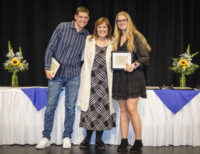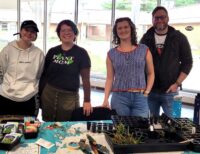Sustainability at MCC
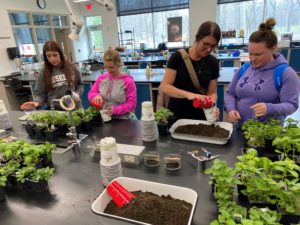 Muskegon Community College is committed to being a leader in sustainability and is a resource for the community. Using a multi-disciplinary and multi-institutional approach, Muskegon Community College endeavors to meet the needs of the present without compromising the future by operating within a sustainable environmental, social, and economic framework.
Muskegon Community College is committed to being a leader in sustainability and is a resource for the community. Using a multi-disciplinary and multi-institutional approach, Muskegon Community College endeavors to meet the needs of the present without compromising the future by operating within a sustainable environmental, social, and economic framework.
Sustainability has been a long practice here at MCC. When this college was newly built in the 1960’s, Mary Kasey Hartz, a biology instructor strove diligently to have approximately 10 acres designated as a natural resource and preserve. In 1970, the MCC Board of 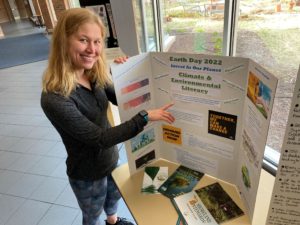 Trustees approved of the Natural Area, which was later renamed as the Kasey Hartz Natural Area. The Land Use Committee originating in the 1970’s and 1980’s was a group of environmentally concerned faculty and staff that monitored items such as paper recycling, soil erosion, and duck populations on campus.
Trustees approved of the Natural Area, which was later renamed as the Kasey Hartz Natural Area. The Land Use Committee originating in the 1970’s and 1980’s was a group of environmentally concerned faculty and staff that monitored items such as paper recycling, soil erosion, and duck populations on campus.
This committee was reinstated in 2004 with members participating in decisions for campus expansion, recycling, and riparian buffer zones to name a few.
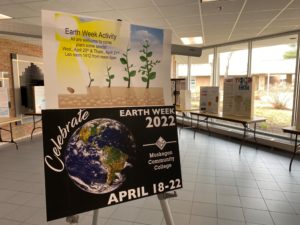 The Joint Sustainability Council was established by the MCC Board of Trustees in June 2014, and was a melding of two campus groups, Land Use Subcommittee and the Sustainability Task Force.
The Joint Sustainability Council was established by the MCC Board of Trustees in June 2014, and was a melding of two campus groups, Land Use Subcommittee and the Sustainability Task Force.
Questions and/or comments can be submitted to sustainability@muskegoncc.edu.
|
Material
|
Please Recycle |
Cannot be Recycled at this Time |
Compost |
| Office Paper/Junk Mail | Paper may be white, colored, glossy, computer, stapled, notebook, or envelopes. | Self-adhesive or windowed envelopes, metal or plastic bound paper, photographs, or computer paper wrappers. | Paper towel, tissues, paper cups. |
| Paper Publications | Catalogs, magazines, ad inserts, newspaper, copy paper, ruled paper, paperback and telephone books. | ||
| Boxboard/Cardboard | Boxes from cereal, tissue, shoes, pop, and packing. | Waxed/lined boxes, frozen food containers, or egg cartons. | Pizza Boxes, frozen food containers, paper egg cartons. |
| Rinsed Containers – lids must be removed. | Tin, aluminum, and steel containers. This includes rinsed food containers and clean aluminum foil. | ||
| Rinsed Glass bottles and Jars – lids must be removed and generally discarded. | Discard lids unless plastic with no adhesive.No fluorescent tubes, ceramics, dishes, light bulbs, or Pyrex containers. | ||
| Rinsed Plastic Containers with lids removed. | Must have arrows and recycle number 1-7. Lids must be removed and may be recycled. Please compress container if possible. | No Styrofoam, straws, tablecloths, plastic wrap, nor bottles that held motor oil or other toxic liquids. If no recycle (chasing) arrows are present it may not be recycled. This includes silverware, plates, or cups. | Compost all food containers from MCC Dining Services except for small dressing containers. |
Recycling at MCC
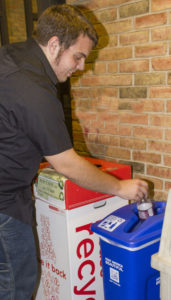
MCC student recycles waste on campus.
Recycling saves natural resources and the energy required to harvest natural resources. Recycling allows valuable materials to be reused. Items recycled at MCC are: clean paper, cardboard, glass, plastics 1-7, metals, returnable bottles and cans, and compostables including food scraps, napkins, hand towels, compostable materials. Ink pens and ink cartridges are also recycled.
Everyone is encouraged to buy only what is necessary. Reuse whenever possible. Reduce consumption by using less. Recycle materials to realize maximum value without waste. Altogether we are trying to reduce: natural resources use, budget costs, global carbon emissions, and landfill waste. Every such effort reflects respect for the Earth and all life. Please practice the 3R’s: Reduce, Reuse, Recycle!
We invite you to join these efforts for a resilient lifestyle and regard for future generations.
Current MCC Joint Sustainability Council
Consists of 16 representatives – faculty, staff, community members and a student.
- Tamera Owens, chair
- Paula Halloran, secretary
Annual Reports



